|
| NEWS |
 |
| New SIPRI book: Anthropocene (In)securities |
| This month, SIPRI and Oxford University Press published a new book Anthropocene (In)securities: Reflections on Collective Survival 50 Years After the Stockholm Conference. This volume brings together an interdisciplinary team of scholars and policy experts to examine what security means in this new world of humanity’s own making. It asks how global institutions can respond to the systemic production of environmental risks and insecurities, and what political innovations are needed to chart a more sustainable path for global development in the decades to come. |
|
|
Read more | Read the WritePeace Essay | Download the book | Order the book
|
|
|
 |
| SIPRI hosts Yemen’s Minister of Foreign Affairs |
|
On 10 September, SIPRI hosted an expert roundtable discussion with the Yemeni Minister of Foreign Affairs, His Excellency Dr Ahmed Awad Bin Mubarak, as part of his official visit to Sweden. The event was held on the theme ‘Towards a Peaceful Resolution for Yemen’ and began with an address by Dr Bin Mubarak. The address was followed by an engaging roundtable discussion and a SIPRI Spotlight interview.
|
|
|
Read more | Watch the SIPRI Spotlight interview
|
|
|
 |
| Chinese translation of SIPRI Yearbook 2020 now available |
|
SIPRI is pleased to announce that the Chinese translation of SIPRI Yearbook 2020 is now available. The SIPRI Yearbook is a compendium of cutting-edge information and analysis on developments in armaments, disarmament and international security. Each year, four major Yearbook data sets are pre-launched, covering international arms transfers, military spending, nuclear weapon stockpiles and the global arms industry. The Chinese-language version of the SIPRI Yearbook has been made possible with the generous support of the Swiss Federal Department of Defence, Civil Protection and Sport.
|
|
|
Read more | Download the translation (PDF) | Explore other translations of the SIPRI Yearbook
|
|
|
 |
| Translations of the SIPRI Yearbook 2021 summary now available |
| Thanks to SIPRI’s translation partners, the summary of SIPRI Yearbook 2021 is now available in Catalan, Dutch, Spanish and Swedish. Released in June 2021, the 52nd edition of the SIPRI Yearbook is a compendium of cutting-edge information and analysis on developments in armaments, disarmament and international security. It is available in print and online from Oxford University Press. |
|
|
Read more | Access SIPRI Yearbook summaries
|
|
|
 |
| Peace Points: Afghanistan |
| In these two Peace Points videos, Dan Smith, SIPRI Director, provides a long-term perspective on the situation in Afghanistan. Part I takes a retrospective look at state-building efforts in the country over the past decades. Part II builds on this analysis and highlights the geopolitical challenges that lay ahead. Peace Points is a film series that seeks to deliver key starting points and analysis from Dan Smith. Each episode is timely and based on recent events in the world. |
|
|
Watch Part I | Watch Part II | Access the Peace Points playlist
|
|
|
|
| COMMENTARY |
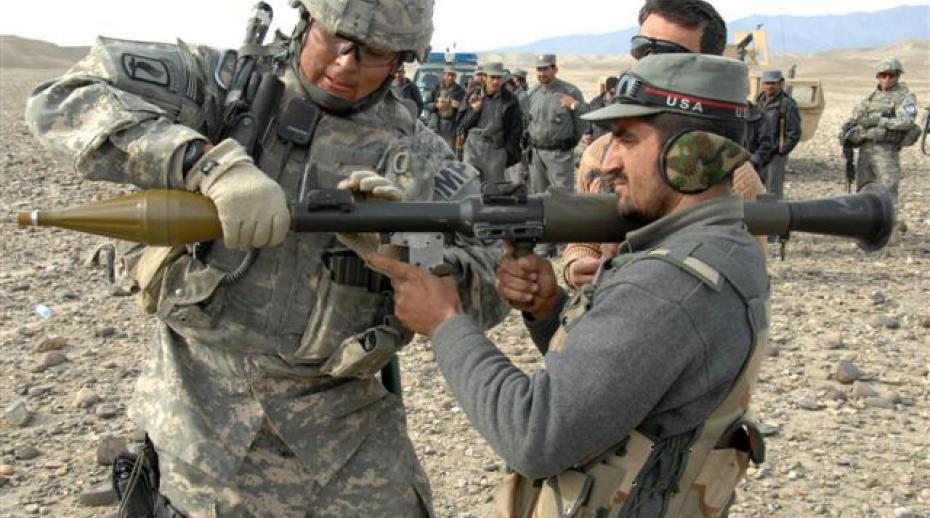 |
| 20 years of US military aid to Afghanistan |
|
With barely half an hour to go before United States President Joe Biden’s deadline to withdraw all US forces from Afghanistan, at 23:29 on 30 August 2021, the last US flight left Kabul’s Hamid Karzai International Airport. This marked the end of a 20-year US-led international military presence. This SIPRI Topical Backgrounder presents data on the military aid given by the USA to Afghanistan between 2001 and 2020.
|
|
Read the SIPRI Topical Backgrounder
|
|
|
|
|
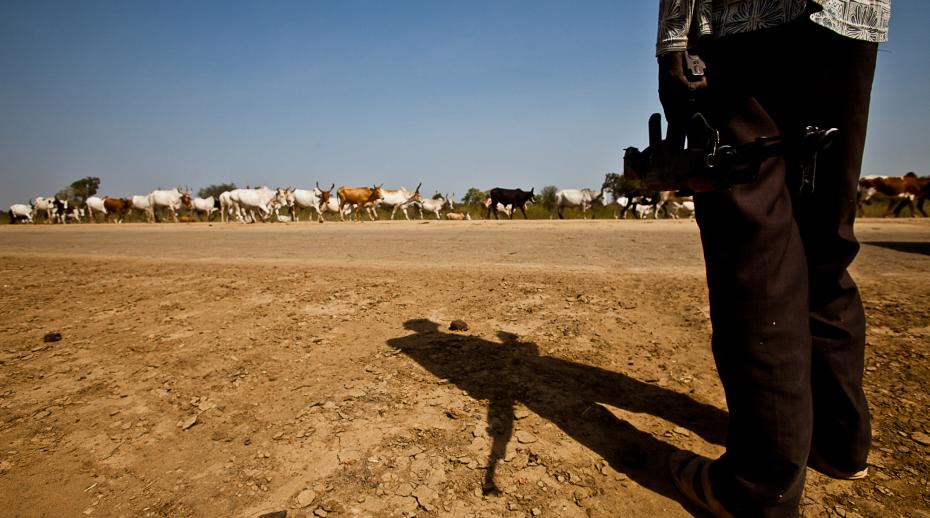 |
| Abyei offers lessons for the region on climate-related security risks |
|
Weather, weapons and wealth have all played roles in the long-running conflict between South Sudan and Sudan over the Abyei area. In 2011, the United Nations Interim Security Force for Abyei (UNISFA) was sent to calm escalating violence. UNISFA is one of the largest UN peacekeeping forces in the world and deployed in one of the most climate-exposed regions. This SIPRI WritePeace Blog examines UNISFA as a case study to derive three important lessons for the mission, as well as for other peacekeeping missions and actors in the region.
|
|
Read the SIPRI WritePeace Blog
|
|
|
|
|
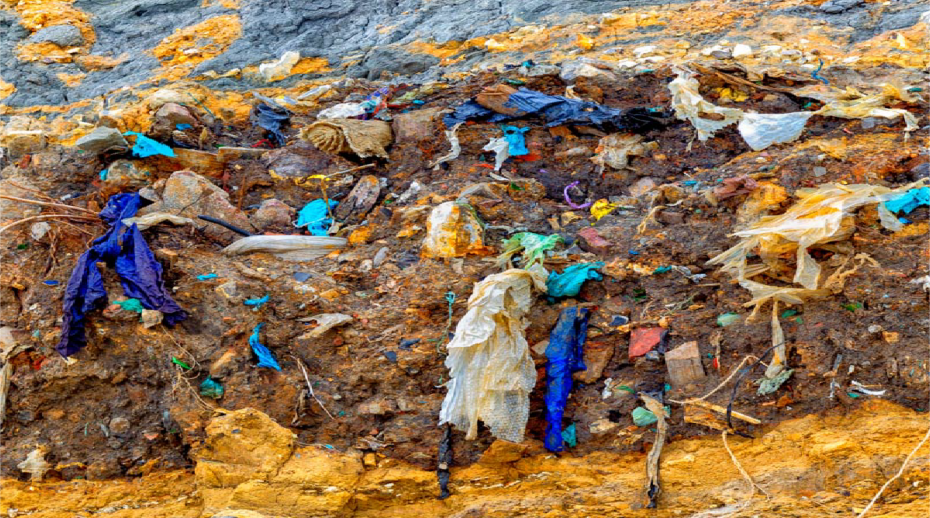 |
| Security, insecurity and the Anthropocene |
|
In this essay, the volume editors present the key themes of their new book Anthropocene (In)securities: Reflections on Collective Survival 50 Years After the Stockholm Conference, published this week by SIPRI and Oxford University Press.
|
|
Read the SIPRI Essay
|
|
|
|
|
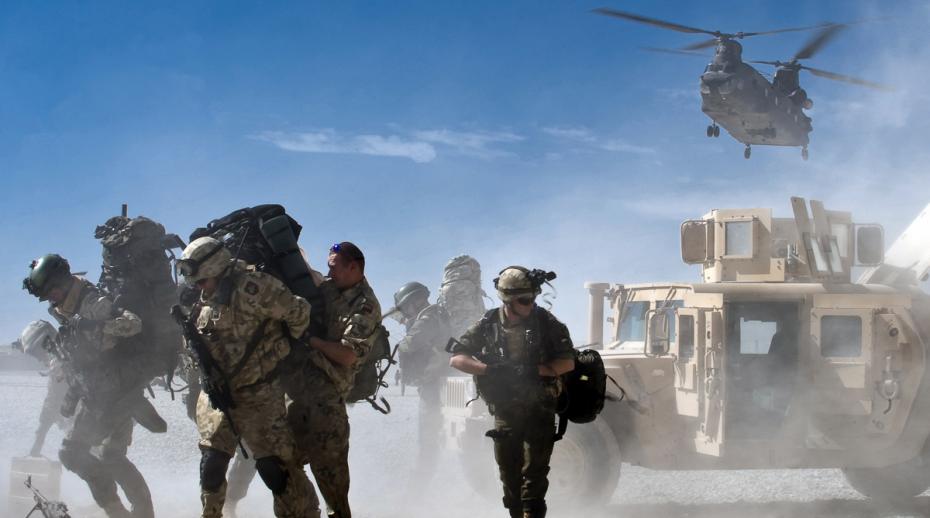 |
| Multilateral peace operations in Afghanistan between 2001 and 2021 |
|
Four multilateral peace operations were deployed in Afghanistan during the 20 years between the start of the US-led intervention that toppled the Taliban government in the country in 2001 and the withdrawal of US and allied troops this year. This SIPRI Topical Backgrounder gives an overview of the four multilateral peace operations that were active in Afghanistan between 2001 and 2021. It presents SIPRI data on the number and categories of international personnel deployed in each operation, drawn from the SIPRI Multilateral Peace Operations Database.
|
|
Read the SIPRI Topical Backgrounder
|
|
|
|
|
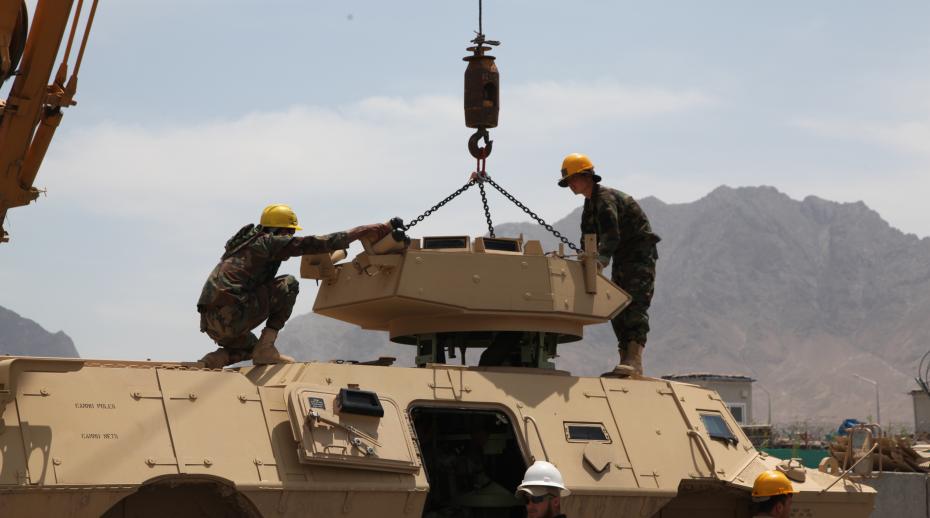 |
| Transfers of major arms to Afghanistan between 2001 and 2020 |
|
Twenty years of US-led international military presence in Afghanistan ended on 30 August 2021, with the withdrawal of the last foreign forces. Since 2001, significant numbers of major arms had been delivered to bolster the Afghan military and security forces. This SIPRI Topical Backgrounder gives an overview of known international flows of major arms to the Afghan armed forces between 2001 and 2020. It discusses the supplier states, volumes, types and numbers of major arms deliveries.
|
|
Read the SIPRI Topical Backgrounder
|
|
|
|
|
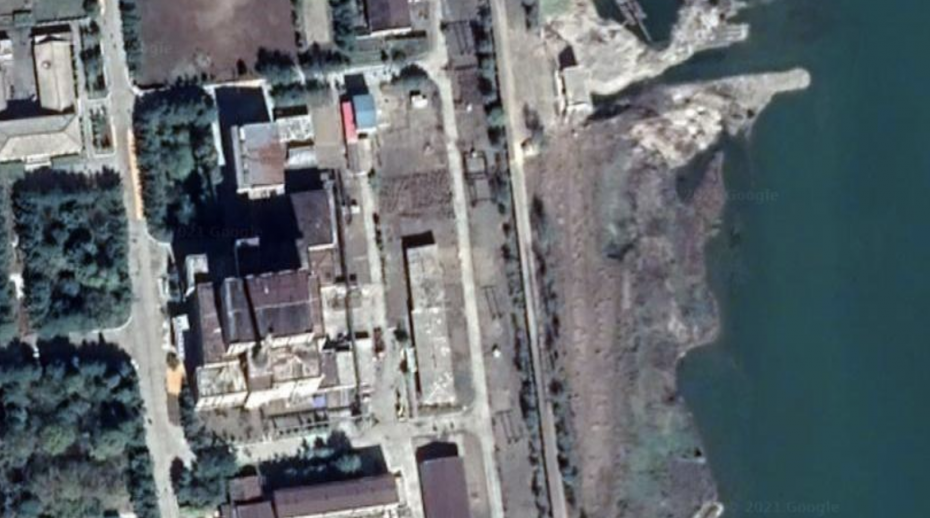 |
| Implications of the reported new activity at North Korea’s Yongbyon nuclear complex |
|
The International Atomic Energy Agency recently reported its conclusion that the Democratic People’s Republic of Korea (North Korea) had resumed plutonium production at its nuclear reactor in Yongbyon in early July this year. The agency also stated that the radiochemical laboratory at the Yongbyon complex appeared to have been active early in the year. This SIPRI Expert Comment reviews these developments in light of the historical background surrounding North Korea’s nuclear programme.
|
|
Read the SIPRI Expert Comment
|
|
|
|
| UPCOMING EVENTS |
| |
| 8–11 November 2021 |
| Stockholm Security Conference: Battlefields of the Future |
|
SIPRI is pleased to announce that the sixth annual Stockholm Security Conference will convene in a virtual format on 8–11 November. The theme for this year’s conference is ‘Battlefields of the Future: Trends of Conflict and Warfare in the 21st Century’. Save the date (8–11 November) and join leading experts, practitioners and policymakers as they exchange views for a better understanding of the challenges to international security and the role of governments, multilateral organizations, humanitarian actors, researchers and civil society in dealing with the challenges of the battlefields of the future.
|
|
Read more
|
|
|
| RECENT EVENTS |
| |
| 24 September 2021 |
| SIPRI at Fix the Food Conference |
|
On 24 September, Dan Smith, SIPRI Director, spoke on a panel at the Fix the Food Conference. The panel was entitled ‘On Sustainable Food Systems and the Triple Nexus’ and featured speakers from a range of global institutions and international organizations. The conference was organized by the Nobel Peace Centre and co-hosted by the World Food Programme.
|
|
Read more
|
|
| |
| 8–10 September 2021 |
| SIPRI contributes to Science Peace Security Conference |
|
On 8–10 September, SIPRI experts actively participated in the 2021 Science Peace Security Conference. The interdisciplinary conference focused on pressing challenges at the intersection of science, peace and security and was held on the theme ‘The Impact of New Technologies: Destabilizing or Enabling Resilience?’. Dr Sibylle Bauer, Kolja Brockmann and Luke Richards engaged on various topics including arms control, missile technologies and artificial intelligence.
|
|
Read more
|
|
|
| STAFF NEWS |
Current vacancies
- Editor (Closing date: 24 October).
|
|
Read more
|
|
|
| PUBLICATIONS |
 |
| Reinvigorating South Asian Nuclear Transparency and Confidence-building Measures |
| This SIPRI Insights paper explores a series of nuclear transparency and confidence-building measures proposed by military, nuclear, political and regional experts from China, India, Pakistan, Russia and the USA to address nuclear challenges in South Asia. |
|
Read the SIPRI Insights on Peace and Security
|
|
|
 |
| Mitigating Humanitarian Impact in a Complex Sanctions Environment: The European Union and the Sanctions Regimes against Iran |
| Iran is one of the most heavily sanctioned countries in the world. The combination of sanctions on Iran imposed by the USA, the UN and the European Union (EU) in response to, among others, nuclear and ballistic missile activities and human rights violations provides for a sanctions environment that is highly complex and difficult to navigate for exporters, financial institutions and humanitarian actors. The report provides specific recommendations for the EU on improving the effective use of sanctions and reducing their humanitarian impact. |
|
Read the SIPRI report
|
|
|
 |
| Anthropocene (In)securities: Reflections on Collective Survival 50 Years After the Stockholm Conference |
| This collection brings together an interdisciplinary team of scholars and policy experts to examine what security means in this new world of humanity’s own making. It asks how global institutions can respond to the systemic production of environmental risks and insecurities, and what political innovations are needed to chart a more sustainable path for global development in the decades to come. |
|
Read the SIPRI/Oxford University Press book
|
|
|
 |
| Enhancing South Asian Nuclear Dialogues: The Implications of Covid-19 |
| Before the global spread of Covid-19, nuclear-armed China, India and Pakistan lacked official diplomatic exchanges to address nuclear weapon-related issues. The pandemic then halted even unofficial dialogues between these countries, which had existed in various bilateral and multilateral formats. This SIPRI Policy Brief explores ways of dealing with this challenge and enhancing nuclear dialogues in South Asia. It considers both longer-term developments in the region and the recent implications of Covid-19. |
|
Read the SIPRI Policy Brief
|
|
|
 |
| Advancing the Role of the OSCE in the Field of Climate Security |
| This SIPRI Policy Brief assesses the role of the Organization for Security and Co-operation in Europe (OSCE) in the field of climate security, in terms of its current and possible future commitments. Despite growing political momentum among most OSCE participating states about the need to address the issue of climate security, there appear to be divergent views on how to move forward on this important issue. Based on an assessment of recent OSCE activities linked to climate-related security risks and interviews with representatives from OSCE participating states, this policy brief suggests a series of recommendations. |
|
Read the SIPRI Policy Brief
|
|
|
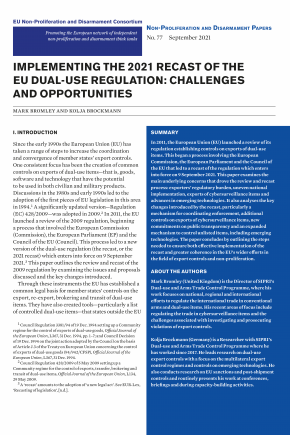 |
| Implementing the 2021 Recast of the EU Dual-use Regulation: Challenges and Opportunities |
| In 2011, the EU launched a review of its regulation establishing controls on exports of dual-use items. This began a process involving the European Commission, the European Parliament and the Council of the EU that led to a recast of the regulation which entered into force on 9 September 2021. This paper outlines the steps needed to ensure both effective implementation of the recast and greater coherence in the EU’s wider efforts in the field of export controls and non-proliferation. |
|
Read the EU Non-Proliferation and Disarmament Paper
|
|
|
 |
| SIPRI Yearbook 2021 |
SIPRI Yearbook 2021 presents a combination of original data in areas such as world military expenditure, international arms transfers, arms production, nuclear forces, armed conflicts and multilateral peace operations with state-of-the-art analysis of important aspects of arms control, peace and international security. It covers developments during 2020, including:
- the state of nuclear arms control and the entry into force of the 2017 TPNW;
- efforts to regulate lethal autonomous weapon systems, and state behaviour in cyberspace and space;
- regional and country-specific overviews of armed conflicts; and
- the impact of the unfolding Covid-19 pandemic and the UN appeal for a global ceasefire to address it.
|
|
Browse the contents page | Download the summary (PDF) |
Order SIPRI Yearbook 2021 | Download the sample chapter on World nuclear forces (PDF)
|
|
|
| |